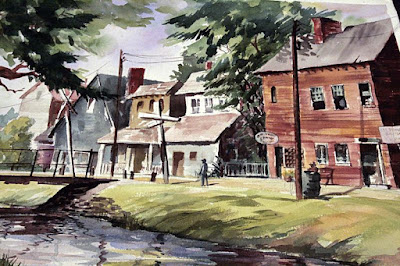Winesburg, Ohio Presentation
At the end of the story, the reader might have the impression (as we did) that the tin box is still there with the money in it. So we decided to change the ending where it allows us to process and read through this in a different way. With this, we intended to illustrate further and from a different angle what the characters value and how they respond to external changes, at least from how we interpreted their dispositions. So the question we have is, what are your reactions with a different ending?
The new ending begins after the second-to-last paragraph (and cuts out the last one). To put it into context, here are the final paragraphs to the story before the new version picks up:
The dead woman’s
son sat down in a chair and looked at the floor. He again thought of his own
affairs and definitely decided he would make a change in his fife, that he
would leave Winesburg. “I will go to some city. Perhaps I can get a job on some
newspaper,” he thought, and then his mind turned to the girl with whom he was
to have spent this evening and again he was half angry at the turn of events
that had prevented his going to her.
In
the dimly lighted room with the dead woman the young man began to have
thoughts. His mind played with thoughts of life as his mother’s mind had played
with the thought of death. He closed his eyes and imagined that the red young
lips of Helen White touched his own lips. His body trembled and his hands
shook. And then something happened. The boy sprang to his feet and stood
stiffly. He looked at the figure of the dead woman under the sheets and shame
for his thoughts swept over him so that he began to weep. A new notion came
into his mind and he turned and looked guiltily about as though afraid he would
be observed.
George
Willard became possessed of a madness to lift the sheet from the body of his
mother and look at her face. The thought that had come into his mind gripped
him terribly. He became convinced that not his mother but someone else lay in
the bed before him. The conviction was so real that it was almost unbearable.
The body under the sheets was long and in death looked young and graceful. To
the boy, held by some strange fancy, it was unspeakably lovely. The feeling
that the body before him was alive, that in another moment a lovely woman would
spring out of the bed and confront him, became so overpowering that he could
not bear the suspense. Again and again he put out his hand. Once he touched and
half lifted the white sheet that covered her, but his courage failed and he,
like Doctor Reefy, turned and went out of the room. In the hallway outside the
door he stopped and trembled so that he had to put a hand against the wall to
support himself. “That’s not my mother. That’s not my mother in there,” he
whispered to himself and again his body shook with fright and uncertainty. When
Aunt Elizabeth Swift, who had come to watch over the body, came out of an
adjoining room he put his hand into hers and began to sob, shaking his head
from side to side, half blind with grief. “My mother is dead,” he said, and
then forgetting the woman he turned and stared at the door through which he had
just come. “The dear, the dear, oh the lovely dear,” the boy, urged by some impulse
outside himself, muttered aloud.
And then here's the new ending, with no break from the previous paragraphs:
Aunt Elizabeth Swift squeezed his
hand and then let go momentarily. She reached
into her pocket, pulling out a small piece of paper.
“Elizabeth
gave this to me to give to you if she died,” she explained, her eyes
crestfallen. “I have no idea what it
says. All she told me was, ‘Give this to
him. Give this to George, just in case.’”
She
stretched her arm out, holding the piece of paper in front of George. He hesitated, looking back at his mother
lying forever, and then took the note.
He started to open it but paused once more, to which his aunt said, “Whenever
you’re ready, George. It doesn’t have to
be right now.”
George
began to cry slightly, and he walked over to his mother. He knelt down and looked at her. He squeezed her hand, still crying, and then held
the note in front of him. He began
unfolding it slowly until he saw the words.
“My
dearest son. On my father’s deathbed, he
tried to tell me to leave this town and live my life how I wanted. But I didn’t.
Although I’m ultimately happy because I ended up having you as a child,
I don’t want you to make the same choice I did.
I want you to feel like you have the freedom to choose. Go out there and find someone to love and
something to do rather than stay in this town.
Go to the city, like you’ve always talked about.
“Near
the foot of my bed, there’s a tin box with eight hundred dollars that my father
gave to me before he died. He told me to
do the same thing I’m telling you to do now.
Take that eight hundred dollars and go.
Break open the wall and go.
“As
my life is ending, yours is only starting.
I love you, George.”
George
dropped the note and froze. He felt his
skin chill as he looked over at the wall.
Upon looking closer, he noticed there was small fissure right around
where his mother said the tin box would be.
He trembled at the side of her bed and then stood up. Almost immediately, he ran out of the room
past his aunt.
“George,
what did it say?” she asked, concerned.
“Nothing,”
he replied, rushing down the stairs to their toolbox. “It didn’t say anything!”
He
rushed to the box, took out a hammer, and then rushed back up the stairs.
“George,
are you sure?”
He
moved quickly to the foot of his mother’s bed and began smashing through the
wall, to which his aunt put her hands to her head and moved quickly to alert
his father, thinking George had lost his mind.
George
smashed through the wall until he realized that there was nothing there. The space was empty, save for the pieces of
plaster that he had just now destroyed.
He slowed and then stopped.
“No,”
he said, falling to the floor.
At
that moment, his father and aunt ran into the room. His father stopped when he saw the hole in
the wall but then moved forward again toward his son.
“George,”
he began. “What are you doing?”
But
George only shook his head, letting tears fall.
“You wouldn’t understand.”
His
father looked over and saw the note from Elizabeth. He sighed deeply and painfully. “I think I do”
His
father sat down next to George. “You’re
my only son, George. And I only want the
best for you. But, a few years ago, I was
in financial ruin. And I didn’t tell
your mother. And I out of frustration hit
this wall so hard that I smashed a hole right through it. And, well.
That’s when I found the box.”
George
looked up. “You used it, didn’t you?” he
said, now standing up and backing away. “You
used it!”
“George,
listen,” his father said, starting to stand up.
“I had to.”
“But
what about me? What about her?” he
replied, gesturing to his mother. “You
stole her money. You stole my money.”
“George,”
his father said. But George only shook
his head.
“How
could you?” he asked, clenching his fists.
“You took away my only way out of this town!”
“Look,
we’ll raise the money somehow,” his father suggested. “I’m sorry!”
And
with those two short words, George let his guard down. His felt his body relax slightly as he began
wiping the tears from his eyes. Yet the damage was still already done.
“I’m
sorry,” his father said again.
George looked at his mother, thinking that at least the dead don’t lie. He broke his gaze and walked slowly over to his father, looking him straight in his green eyes. Yet without saying a word, he shook his head and turned, walked past his aunt, and left the room, leaving his father with his mother and the empty space in the wall.
George looked at his mother, thinking that at least the dead don’t lie. He broke his gaze and walked slowly over to his father, looking him straight in his green eyes. Yet without saying a word, he shook his head and turned, walked past his aunt, and left the room, leaving his father with his mother and the empty space in the wall.


The new ending to the story “Death" ties the plot into a much tighter knot than the original ending by Anderson. Anderson’s use of unresolved plot lines throughout the novel clearly alludes to a deeper meaning for which the reader must search. To me, the open-ended conclusions to his stories — including that of this story — represent the messiness of life itself. Our lives never follow a linear plot line, and they certainly never culminate in a perfect conclusion; we leave family behind, we leave behind secrets and unfinished business, and nobody will ever know how his/her life may have been different given different circumstances.
ResponderExcluirAnderson’s anti-climactic conclusion to “Death” seems to represent not only the banality of life, but also the the reality that there is more to death than the death itself. When Elizabeth dies, she brings the secret of the tin box to the grave with her. We will never know if George will find the box, let alone use it to get out of Winesburg. Although Elizabeth is unable to gift the box to her son, there remains a chance that he will find, and use it.
The alternate ending to the story, in which George’s father has found and used the money, resolves the plot line in two ways. First, it removes the mystery over whether or not anyone will find the hidden box, and it theoretically ruins any chance that George has to leave Winesburg. Contrary to the original ending, this new ending leaves no room for readers to ponder the fate of the box of money. However, although we do know that George will not be able to use his mother’s money to leave the town, we are left with the possibility that he finds another way out.